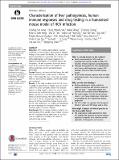Characterisation of liver pathogenesis, human immune responses and drug testing in a humanised mouse model of HCV infection
Author(s)
Keng, Choong Tat; Sze, Ching Wooen; Zheng, Dahai; Zheng, Zhiqiang; Yong, Kylie Su Mei; Tan, Shu Qi; Ong, Jessica Jie Ying; Tan, Sue Yee; Loh, Eva; Upadya, Megha Haridas; Kuick, Chik Hong; Hotta, Hak; Lim, Seng Gee; Tan, Thiam Chye; Chang, Kenneth T E; Hong, Wanjin; Chen, Jianzhu; Tan, Yee-Joo; Chen, Qingfeng; ... Show more Show less
DownloadChen_Characterisation of liver.pdf (3.391Mb)
PUBLISHER_CC
Publisher with Creative Commons License
Creative Commons Attribution
Terms of use
Metadata
Show full item recordAbstract
Objective HCV infection affects millions of people worldwide, and many patients develop chronic infection leading to liver cancers. For decades, the lack of a small animal model that can recapitulate HCV infection, its immunopathogenesis and disease progression has impeded the development of an effective vaccine and therapeutics. We aim to provide a humanised mouse model for the understanding of HCV-specific human immune responses and HCV-associated disease pathologies.
Design Recently, we have established human liver cells with a matched human immune system in NOD-scid Il2rg−/− (NSG) mice (HIL mice). These mice are infected with HCV by intravenous injection, and the pathologies are investigated.
Results In this study, we demonstrate that HIL mouse is capable of supporting HCV infection and can present some of the clinical symptoms found in HCV-infected patients including hepatitis, robust virus-specific human immune cell and cytokine responses as well as liver fibrosis and cirrhosis. Similar to results obtained from the analysis of patient samples, the human immune cells, particularly T cells and macrophages, play critical roles during the HCV-associated liver disease development in the HIL mice. Furthermore, our model is demonstrated to be able to reproduce the therapeutic effects of human interferon alpha 2a antiviral treatment.
Conclusions The HIL mouse provides a model for the understanding of HCV-specific human immune responses and HCV-associated disease pathologies. It could also serve as a platform for antifibrosis and immune-modulatory drug testing.
Date issued
2015-07Department
Massachusetts Institute of Technology. Department of Biology; Koch Institute for Integrative Cancer Research at MITJournal
Gut
Publisher
BMJ Publishing Group
Citation
Keng, Choong Tat et al. “Characterisation of Liver Pathogenesis, Human Immune Responses and Drug Testing in a Humanised Mouse Model of HCV Infection.” Gut 65.10 (2016): 1744–1753. © 2017 BMJ Publishing Group Ltd & British Society of Gastroenterology
Version: Final published version
ISSN
0017-5749
1468-3288